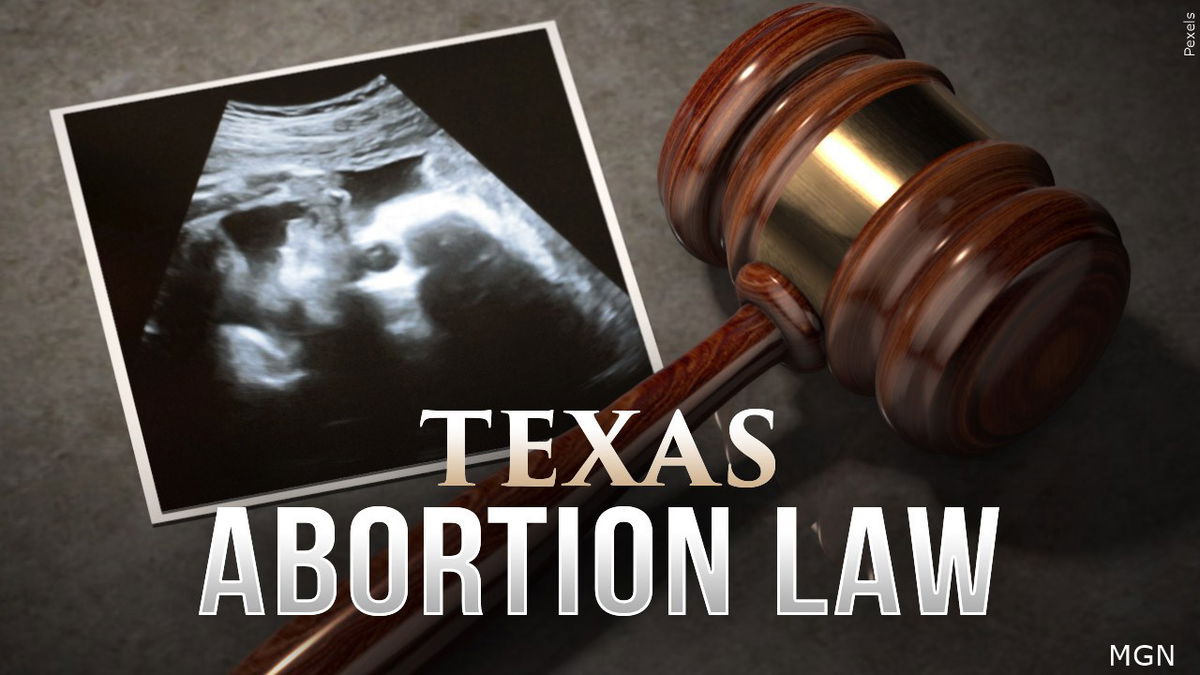What to know about the developing state court fight over Texas’ abortion law

By Tierney Sneed, CNN
Abortion clinics and their allies are engaged in a game of Whac-A-Mole as they’ve obtained state court orders blocking individual anti-abortion activists from enforcing Texas’ six-week abortion ban — for now.
But the effort has a larger end game: securing a Texas Supreme Court ruling striking down the law.
Those abortion rights advocates see Texas state courts as a critical front in their fight to take down the controversial law, particularly since the federal lawsuit challenging it has been stymied by the measure’s novel design.
The same procedural questions that are undermining the federal legal fight could throw wrenches in the state court gambit. But a Texas Supreme Court judgment against the law would nonetheless send a valuable signal that could curtail its reach.
The Texas law, SB8, deputizes any private citizen in the country with the power to bring civil litigation, in Texas state courts, against abortion providers accused of violating the ban. It opens up clinics — and anyone else accused of “aiding and abetting” women in getting abortions after about six weeks — to the threat of unending litigation that could drive them out of business. So clinics and groups that facilitate abortion access are going on a state court counteroffensive, rather than just waiting for their federal challenges to the law play out.
In the short term, abortion providers are hoping to protect their workers from individual anti-abortion activists who would seek to wield the six-week ban against them. Their success so far has been narrow. Getting a temporary order that would broadly block enforcement of the ban is procedurally difficult, if not impossible. Abortion rights advocates have so far depended on one-by-one strategy, seeking court orders against the group Texas Right to Life and select activists who have been most vocal about enforcing the law.
Those cases, however, could provide a vehicle for a broader ruling from the Texas Supreme Court striking down major parts of the law. That outcome might not be enough to protect abortion providers entirely from the ban’s impacts, but it could buy some relief while the federal suit challenging the law has been allowed — by the US Supreme Court and a federal appeals court — to stall out.
“Even if these lawsuits can’t get all the way to the end to blocking this on a statewide level, there’s still value,” said Stephen Vladeck, a CNN Supreme Court analyst and professor at the University of Texas-Austin School of Law. “Even if (abortion providers) can’t get all the relief that they need, there’s value in getting more relief than none.”
What can state courts do right away?
Texas’ law — which prohibits abortions after fetal cardiac activity is detected — appears to be directly at odds with the US Supreme Court’s 1973 Roe v. Wade ruling and later cases affirming that decision. Those federal cases enshrined a constitutional protection for abortion before viability, which is about 23 weeks into pregnancy.
Yet federal court challenges citing those precedents have yet to block the Texas law, which went into effect last week, because of its clever design. Federal courts have been quick to block strict abortion laws that impose criminal or regulatory punishments, because they can target those orders at the specific government officials in charge of implementing the punishments. But the Texas ban’s enforcement mechanism — by tasking any private citizen with the ability to sue clinics and others — has scrambled that typical route of fighting against the law, and the federal judiciary is still weighing that procedural question.
In the meantime, clinics and other abortion rights advocates have already secured temporary state court orders to preemptively block specific anti-abortion activists from bringing SB8’s civil enforcement actions against them.
The first round of temporary restraining orders were secured early last week, right before the law went into effect. Those orders blocked Texas Right to Life from enforcing the law against the Bridge Collective, a group that facilitates transport to clinics, as well as two individual attorneys who help women access the procedure.
“It was super important for us to protect our volunteers, and we felt that the best way to do that was to proactively attack this bill, with both the (temporary restraining order) piece and the lawsuit,” Kristina Arike, the treasurer of the Bridge Collective, told CNN last week.
Texas Right to Life has scoffed at the effort, which also included a temporary restraining order secured by Planned Parenthood clinics against the group. Its court filings have noted that as long as clinics appear to be complying with the six-week ban — and so far, no clinic has publicly sought to violate it — its activists don’t intend to file any lawsuits to enforce the ban against them.
Jonathan Mitchell, the attorney for the group in the case, declined to comment on the record for this story. America First Legal Foundation — a legal advocacy group led by former Trump White House aide Stephen Miller — is also pitching in on the defense of the anti-abortion activists.
In a statement last week, Texas Right to Life warned that “Planned Parenthood can sue us, but they can’t sue every Texan.”
“As long as they commit abortions, they are liable under the life-saving Texas Heartbeat Act,” the statement said.
An attorney for abortion funds, Elizabeth Myers, told a Travis County district judge last week that an order against Texas Right to Life would send a signal that would discourage other individuals thinking of suing her clients under SB8. The abortion funds would seek restraining orders against those individuals as well if they brought enforcement litigation, Myers told the judge.
Where will the state court cases go next?
Next Monday, there will be court hearings in the cases brought by Planned Parenthood and the abortion access groups to examine whether the temporary restraining orders against Texas Right to Life — which expire after 14 days — should be converted to orders that would last for as long as the cases are being litigated.
After that question is decided, the cases will move to the merits of what the clinics and the abortion funds are arguing: that SB8 violates the Texas Constitution. That question will ultimately be settled by the Texas Supreme Court. The process of appealing to that court will take at least weeks, if not months, though the abortion rights advocates are hopeful that the proceedings will be expedited to prevent it from taking years.
The lawsuits brought by abortion funds target the ban’s enforcement mechanism, alleging that it violates several due process protections in the Texas Constitution as well as its protections for free speech. Some of the abortion access organizations — particularly those not involved in the main federal lawsuit — are also bringing free speech and equal protection claims under the US Constitution in their state court litigation.
“The ultimate goal is a declaratory judgment that would be held by the Texas Supreme Court finding that the law, SB8, is unconstitutional,” Jennifer Ecklund, another attorney for the abortion funds, told CNN.
Such a ruling by the Texas Supreme Court, Ecklund said, would then obligate any lower court to dismiss a private enforcement action that anti-abortion activists brought against clinics or their allies under SB8.
The Planned Parenthood lawsuit makes similar arguments while also launching a frontal attack against the abortion ban. Its court filings argue that the six-week prohibition violates provisions in Texas’ Constitution that protect “personal privacy from unreasonable intrusion and unwarranted interference with personal autonomy.”
“We are ultimately seeking a final court decision that declares SB 8 unconstitutional throughout the state in order to restore abortion access to the millions of Texans who need it,” Julie Murray, a senior staff attorney at Planned Parenthood Federation of America, told CNN in a statement.
Will a Texas Supreme Court judgment put an end to the legal fight?
It’s still not clear if such a ruling would be enough to discourage any private citizen from bringing an SB8 enforcement action against clinics. The ban is structured in a way that incentivizes even the most frivolous of enforcement actions brought under the law. Abortion clinics are prohibited from having their attorneys’ fees reimbursed even if they win the SB8 enforcement cases, so those bringing the lawsuits won’t suffer any consequences from cases that will automatically be thrown out.
“And therein lies the rub: How does a provider avoid an endless system of these lawsuits, even after the Texas Supreme Court has said that SB8 is unconstitutional?” Vladeck asked.
The-CNN-Wire
™ & © 2021 Cable News Network, Inc., a WarnerMedia Company. All rights reserved.




